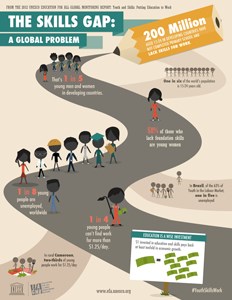'Put education to work' call by world's youth
The campaign, which started on Human Right's Day, is rallying young people to call on governments to 'put education to work' and help them get dignified jobs. To enable young people who are both on and off-line to take part, the global SMS campaign allows young people to have their say, no matter where they live. They can just text their name, age, country and what job they would do if they had the skills to +44 7580 484 263.
'Let's put education to work' is fronted by A'Salfo, a musician from Cote d'Ivoire and the youngest ever United Nations Goodwill Ambassador and run with partners, Visual.ly, Frontline SMS, Peace Child International, TakingITGlobal and the Youth Employment Network.
The campaign aims to gather content by young people to create a user-generated multi-media online magazine on the crisis of the youth skills deficit. The Global Monitoring Report and young campaigners will then deliver the messages to ministers of education and media in the New Year.
Young people are encouraged to join the campaign in a variety of multi-media ways. From 10 December 2012, campaigners are encouraged to take part in an infographic competition with online partner Visual.ly, from data showing young people's desperate need for skills. Winners will become certified designers on Visual.ly's online Marketplace. Meanwhile, campaign partner TakingITGlobal is hosting an online petition and photo/film contest.
Amy O'Donnell, radio project manager at Frontline SMS says, "Campaigning is inherently interactive - it's important not only to push out messages but crucially to listen to those who are affected. With 3.3 billion active mobile users worldwide, SMS is a very powerful and accessible way of running a campaign, which is to represent the voices of the disadvantaged. By setting up the ability for farmers to send their views by text from a village in Northern Nigeria, or a slum in Delhi, it is exciting to see how the Global Monitoring Report's campaign will help build a picture of young people's views in a new innovative way."
Campaign under way
Already, many hundreds of young people have joined the campaign, taking part in online polls sending in photos and writing blogs. A Facebook poll, spanning numerous countries including Brazil, Pakistan, Somalia, Zimbabwe, Iran, Egypt and Spain, shows 90% of under 30-year-olds think that their government does not do enough to help disadvantaged young people learn relevant skills for work.
A second poll run by campaign partner, Peace Child International, shows that young people are calling for 'transferable skills' to be taught in high school so they would emerge confident to face different work environments and tackle job interviews. The poll result showed over one in five wished they had been taught entrepreneurial skills in high school; just less than one in five would have liked to have been trained in communications skills.
Pauline Rose, director of the Global Monitoring Report said, "Our report lays out the facts: A fifth of young people today never completed primary school and lack the skills they need to find jobs that can pay them a decent wage. Our new campaign is to help bring change from the huge groundswell of young people's frustration behind these statistics. The world has ever seen this largest youth population. We are excited about pulling together their voices anecdotes from pay as you go mobiles in developing countries and twitter in richer countries such as Spain. Join us - go to our website and sign up."
Campaign recommendations
The following are the recommendations being put to governments by the young campaigners:
1. We want more governments to recognise the importance of a second chance education for young people who missed out on primary school the first time around.
2. We want see specific mentions of ways governments plan to include girls, and the poor in rural and urban areas in skills training plans
3. We want education systems to become more relevant to work, providing general education combined with actual work experience.
Srosh, a young woman from Pakistan who helped draft the youth version of the Global Monitoring Report gave one of the first quotes to be included in the message to Ministers, saying, "Education is a not a threat, it's a blessing. It brings awareness, confidence, sustainability and prosperity. We cannot expect to change the future with more than half of female population uneducated and unskilled."
Campaigners wanting to join 'Let's put education to work' should go to the Global Monitoring Report's website www.efareport.unesco.org and follow the conversation on twitter on @efareport and #YouthSkillsWork.
